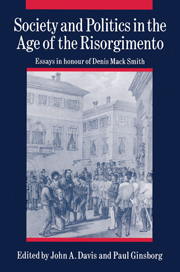Book contents
- Frontmatter
- Contents
- List of figures and maps
- List of contributors
- Preface
- Map 1 Italy in 1815
- Map 2 Italy in 1870
- Map 3 Italy – place names
- 1 1799: the Santafede and the crisis of the ancien régime in southern Italy
- 2 War and society in Napoleonic Italy: the armies of the Kingdom of Italy at home and abroad
- 3 The poor and how to relieve them: the Restoration debate on poverty in Italy and Europe
- 4 Bandits, violence and the organization of power in Sicily in the early nineteenth century
- 5 Marriage and the family in Italy in the early nineteenth century
- 6 After the Revolution: bandits on the plains of the Po 1848–54
- 7 Labouring women in northern and central Italy in the nineteenth century
- 8 Garibaldi in England: the politics of Italian enthusiasm
- 9 The middle classes in Liberal Italy
- 10 Francesco De Sanctis: the politics of a literary critic
- Bibliography of Denis Mack Smith's writings on nineteenth-century Italy
- Index
10 - Francesco De Sanctis: the politics of a literary critic
Published online by Cambridge University Press: 30 January 2010
- Frontmatter
- Contents
- List of figures and maps
- List of contributors
- Preface
- Map 1 Italy in 1815
- Map 2 Italy in 1870
- Map 3 Italy – place names
- 1 1799: the Santafede and the crisis of the ancien régime in southern Italy
- 2 War and society in Napoleonic Italy: the armies of the Kingdom of Italy at home and abroad
- 3 The poor and how to relieve them: the Restoration debate on poverty in Italy and Europe
- 4 Bandits, violence and the organization of power in Sicily in the early nineteenth century
- 5 Marriage and the family in Italy in the early nineteenth century
- 6 After the Revolution: bandits on the plains of the Po 1848–54
- 7 Labouring women in northern and central Italy in the nineteenth century
- 8 Garibaldi in England: the politics of Italian enthusiasm
- 9 The middle classes in Liberal Italy
- 10 Francesco De Sanctis: the politics of a literary critic
- Bibliography of Denis Mack Smith's writings on nineteenth-century Italy
- Index
Summary
The name of Francesco De Sanctis has never been widely known outside Italy because literary criticism travels less well than literature and is almost inevitably less durable. For thirty years after his death, none of his writings was translated except a single lecture into German, and in England he rated only one brief reference by George Saintsbury. But according to Benedetto Croce he was one of the truly great intellectuals of Italian history; and Gaetano Salvemini, who disagreed with Croce on almost everything, placed De Sanctis among the four Italians of his century who could be called a genius: the others were Leopardi, Cavour, and Cattaneo. These four in Salvemini's judgement took precedence over Manzoni and Verdi who for many people would come first to mind, and ahead of Mazzini and Garibaldi for whom Salvemini had a special veneration. De Sanctis is known for his critical studies of individual writers – among them Dante, Petrarch, Foscolo, Manzoni, and Zola – but above all for a general history of Italian literature published in 1870–1. Less well known is his interest in politics, an interest that was both practical and theoretical and which made him an illuminating critic of Italian society.
De Sanctis was someone of great originality of mind who lived for literature but was fascinated by the development of Italy as a nation. In particular he was puzzled by the question of why the immense potential of this country was apparently unrealized despite the creation of a unified national State, and he located the main explanation in its defective political system.
- Type
- Chapter
- Information
- Society and Politics in the Age of the RisorgimentoEssays in Honour of Denis Mack Smith, pp. 251 - 270Publisher: Cambridge University PressPrint publication year: 1991



